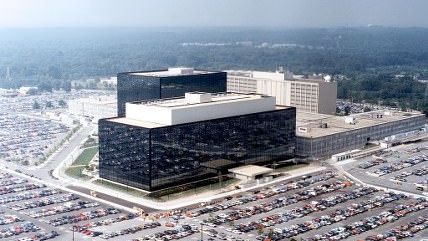Court Asks How Freedom Act Surveillance Changes Affect ACLU Lawsuit Against NSA
Civil liberties group has publicly called for even stronger reforms.

Let's start with a quick recap on where things stand with the federal bulk collection of the metadata of Americans living in the United States. Once upon a time the National Security Agency (NSA) and FBI decided that Section 215 of the PATRIOT Act gave them the authority to collect telephone and Internet metadata from all Americans without a warrant, despite the fact that Section 215 said that the data collected had to be relevant to an investigation. The extremely secretive Foreign Intelligence Surveillance (FISA) Court allowed this. We, as Americans, were not informed that this was going on. The American Civil Liberties Union (ACLU) had previously challenged some of the warrantless wiretap authorities granted by the court under the FISA Amendments Act and lost before the Supreme Court, because they couldn't prove that they—or anybody—had actually been monitored. They couldn't prove standing.
Then in 2013 Edward Snowden came around and leaked the NSA's surveillance secrets, revealing that essentially we all have standing to challenge federal surveillance. They're collecting all our phone metadata. The ACLU then filed suit specifically against this 215 dragnet surveillance. It made its way up to the 2nd Circuit Court of Appeals, which ruled in May that Section 215 did not actually authorize the extent of surveillance the NSA and the FISA court claimed.
But the court did not mandate any changes just yet. That was because Section 215 of the PATRIOT Act was set to expire June 1, and the court wanted to permit Congress to be more specific about what authority it intended to give the NSA. That led to the surveillance compromise known as the USA Freedom Act, which ended mass metadata collection of all Americans in favor of some mass collection based on more specific terms. It also led to the sunsetting of Section 215 over the objections of some in the Senate, forced by the House's embrace of the Freedom Act and Sen. Rand Paul's refusal to accommodate the security conservatives of the Senate.
Wow, that wasn't a quick recap at all! Apologies. I bring all of this up, though, because now that Congress has passed the USA Freedom Act, the 2nd Circuit Court is back in action again. On the assumption that the USA Freedom Act describes now the surveillance authorities Congress actually intended, the 2nd Circuit Court wants to know how this affects the ACLU's lawsuit, so it's asking for interpretations from both sides:
"In light of these developments, it is hereby ORDERED that the parties are directed to submit supplemental briefs, not to exceed twenty pages in length, regarding the effect of the USA FREEDOM Act on the above-captioned case, and in particular whether any or all of the claims asserted by the plaintiffs-appellants have been rendered moot as a result of that legislation, by July 24, 2015."
The ACLU neither supported nor opposed the version of the USA Freedom Act that passed. It supported an earlier, stronger version of the bill. After it was watered down, the ACLU sent a letter to the House recommending enhancements to further ensure bulk metadata collection doesn't continue, improve the process by which irrelevant records are destroyed, improve transparency of the FISA court, and other reforms. The ACLU did not get their requested alterations.
The ACLU's neutral stand on the Freedom Act doesn't inherently make it clear whether or not it thinks the claims of its lawsuit are now moot. So I contacted their office, and in response its pointing to how the the executive branch has actually reacted to the passage of the USA Freedom Act. The Obama Administration, which publicly praised the ending of bulk data collection authority, has asked the FISA court to allow it to resume bulk data collection anyway, regardless of the 2nd Circuit Court's ruling, while it sets up its surveillance system to comply with the USA Freedom Act.
As such, Patrick Toomey, staff attorney for the ACLU's national security project, told Reason in an e-mailed statement that the lawsuits are still relevant:
"It is disappointing that the government is trying to resuscitate the bulk collection of everyone's call records. That program has been shown to be unlawful and unnecessary, and its expiration on June 1 should have been the final word on it. It's no surprise that the courts want to know how the new legislation affects the pending cases. But the government is going to have a hard time arguing that those lawsuits are moot when it has just asked the FISA court to allow it to restart its bulk collection of Americans' call records."


Show Comments (17)